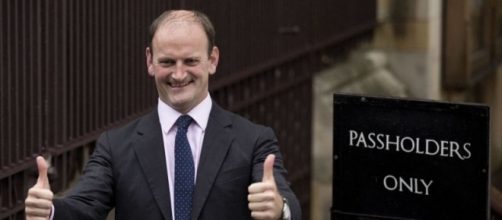Douglas Carswell confirmed on Saturday that he was leaving Ukip.
The 45-year-old, who joined the party in August 2014 has decided to go down the independent route and not represent a major political party. His departure means UKIP now has no members in the House of Commons.
The former Tory currently represents the people of Clacton in Parliament and he has stated that he will not be triggering a by-election in his constituency because he is not defecting to another party.
News of his departure has been welcomed by several senior UKIP members, but where does this leave the party in British politics?
Outspoken figure
Born in 1971, Douglas Carswell has never been shy of raising an opinion or supporting a campaign he is passionate about.
He first stood for Parliament in 2001, actually challenging Prime Minister Tony Blair in his Sedgefield constituency. He lost this battle to Blair but reduced his majority and this signalled his intent of trying to make a difference.
Four years later, he entered the Commons, winning the seat as MP for Harwich. He was a big early supporter of David Cameron's policies, having worked under him in the Conservative Party policy unit.
Carswell also was a prime mover in driving forward Mr Cameron's Big Society campaign and in 2009, campaigned prominently for the reformation of parliament expenses following the scandal that shamed many MPs.
His main mission though was to get Britain out of the European Union. In 2014, he seized this opportunity and surprised everyone by quitting the Conservatives for UKIP. Then, he did trigger a by-election in Clacton, which he ultimately won.
Seven months later, he retained that seat in the 2015 General Election, becoming UKIP's first-ever MP through a General Election. It was by a reduced majority though and things were never rosy between him and then-leader Nigel Farage.
Never best buddies
In the political spectrum, it is well-known that the relationship between Douglas Carswell and Nigel Farage was strained to say the least. Even when they posed together on his arrival into the party, the body language looked forced and strange.
Insults and negative comments have been traded, more so in recent months. Recently, Mr Farage accused Mr Carswell of "actively working against UKIP" and called on him to quit.
Now Farage has his wish. In a post on his website, Carswell said: "I switched to UKIP because I desperately wanted us (the UK) to leave the EU. Now we can be certain that is going to happen, I have decided that I will be leaving UKIP."
His exit won't surprise many in Westminster on what has been a tragic week following the terror attack in the area on Wednesday afternoon.
It is anticipated that Prime Minister Theresa May will trigger Article 50 next week, which will formerly begin Britain's notification to leave the European Union.
Where does this leave UKIP?
On a European scale, UKIP is still in good shape. They have 20 MEPs in the European Parliament, making it the joint-largest UK party.
From a UK perspective, it has little influence. No members in the Commons and only three representatives in the House of Lords. The current leader is Paul Nuttall and he recently lost his bid to enter Parliament, coming second in the Stoke Central by-election to Labour's Gareth Snell.
Founded in 1993, UKIP's mission was simple - getting Britain out of the EU. It was accomplished last June in the referendum which was the perfect time for Farage to step aside as leader. Of course, the EU result also ended Cameron's political career and nearly took Jeremy Corbyn's with it too.
After Carswell's departure, Liberal Democrat leader Tim Farron posted on his Twitter account: "Douglas Carswell quitting shows UKIP now has no purpose. Theresa May is effectively their leader and has adopted their hard Brexit agenda."
UKIP could say their job is done. In reality, it means the Commons is still dictated by a two-party system despite recent challenges from other parties.

